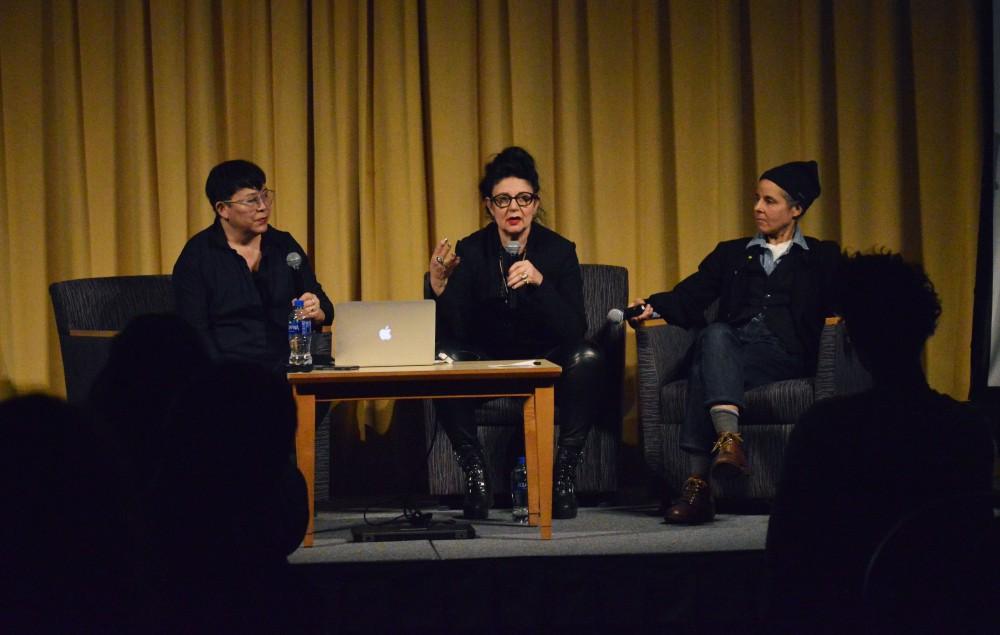Feminist artist group gives lecture on activism

GVL/Hannah Zajac— Creators of Fierce Pussy give a lecture on the power of feminism in Kirkhoff on Thursday 15 Feb 2018.
Feb 19, 2018
Formed in 1991, “fierce pussy” is a lesbian feminist artist collective known for its activism during the AIDS crisis. Nancy Brooks Brody, Carrie Yamaoka and Joy Episalla, three of the four “fierce pussy” original core members, delivered a lecture at Grand Valley State University on Thursday, Feb. 15, in the Kirkhof Center Grand River Room.
The talk consisted of a spoken-word performance, a chronological breakdown of the group’s art and activism, and a brief Q&A session. Prior to the lecture, the “fierce pussy” members (who asked to be quoted as a collective) shared some of their thoughts on activism, social media and campus lectures.
“We don’t go around speaking to people very often,” they said, “but hopefully, from the talk we do tonight, people will be inspired to create their own activism work. It worked really well out in Columbus, and it worked really well at Harvard.”
The lecture began with a presentation of the group’s third “Transmission” piece. A spoken-word piece from the perspective of humans from the future, “Transmission” contains socio-political commentary touching on issues such as health care, sexual assault, prison and climate change.
A chronological retrospective of the work of “fierce pussy” made up the bulk of the lecture. Beginning with the group’s formation in 1991, the lecture explored various notable instances of their activism, such as posters that appropriated derogatory terms such as “dyke,” “lezzie” and “butch.”
“We’ve now taken those derogatory terms back; we’ve reclaimed them,” they said. “If (you) look at the terms, they’re just words. Although it might have started out being derogatory, it’s become positive. It’s inclusion—we’re including you in the possibility.”
In the lecture, the group detailed the many artistic mediums and tactics they explored, including posters, renaming street signs after queer icons and redesigning bathrooms at various LGBT centers.
Another important feature of the style of activism of “fierce pussy” is the guerrilla aspect of their work. Their early work was largely illegal and had to be set up quietly while they looked out for police. Today, “fierce pussy” is exploring the possibilities that the internet and social media pose for their activism.
“We depend on everybody to freely distribute our work,” they said. “We don’t have any restrictions on that. If people want to take a picture of our poster and post it on Instagram or Facebook, we totally support that. Our website has downloadable PDFs so people can print their own posters and disseminate any way they care to.”
The group conducted a brief Q&A to conclude the lecture and answered questions regarding lesbians in entertainment and health care. Attendees of the event were also given posters with the text of “Transmission,” the opening spoken-word piece.
In terms of advice for young activists and artists, especially those working in the queer and feminist fields, “fierce pussy” stated that communication and mutual understanding are crucial.
“Communicate with each other,” they said. “Get together and talk about the things that affect your lives. Whether it be DACA, sexual assault, bullying, … find like-minded people. You start to have a bit of a hive, and you can start thinking about ways to work together.”
While art can be a form of activism, one “fierce pussy” artist shared that activism extends beyond art into one’s personal life: “Resistance takes many forms. How you live your life is an act of resistance.”

























